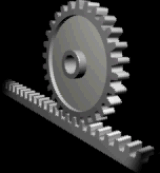The Problem with Economics Journalism

The grey car, on the other hand, has deployed an incredible 5-speed synchromeshed transmission system. Drivers have told me that the gear change is short-throw and very positive. Perhaps less exciting was their decision to stick with a familiar braking technology - drum brakes, rather than disc brakes. Sources close to the manufacturer claim this will definitely pay off in terms of higher speeds.
The blue car's manufacturers have been stressing the benefits of achieving a better power-to-weight ratio, and have managed to lighten their car by building the body of the vehicle out of plastic. They have also fitted the front and rear with a downforce-reducing technology they are calling "inverse spoilers". The manufacturers say this will significantly reduce the amount of weight on the road and "you'll see some serious performances at speeds over 80MPH".
And that brings my commentary on this event to an end.
Imagine if that was the radio commentary on a car race, and that the entire commentary for the duration of the race was like that.
This is the problem I have with a lot of economics journalism - and quite a few other types of journalism, too. The above 'commentary' may be interesting for people who know about cars (and the jokes might amuse), but surely even the biggest petrol head wants an occasional update on who's winning and which car is the fastest (or corners best, or even which is least likely to kill the driver). I'm not claiming that any of this is a brilliant metaphor for the current economic situation, of course.
Equally, the above commentary could just as easily be a motoring journalist reviewing the new model line-up from different manufacturers. Which car should you buy? There is a problem here. Depending on your particular requirements from a car and your price range, there is generally going to be one particular model at any given time that best suits you*. But if I was a motoring journalist and I just flat-out told you exactly what it was then suddenly huge numbers of people would start buying that car. On a frivolous note, suddenly I'd be regularly facing the same model of car at the lights and thus lose any competitive advantage I had (personally, that wouldn't bother me - I'd rather see the best design and engineering win). And besides, I generally don't race people off the lights.
More seriously, the manufacturer might grab such a large market share that they then rest on their laurels and neglect the research and development that made them great in the first place, driving down the standard of car engineering overall as a result of the brand inertia that comes from people sticking with what they know. Or rival manufacturers seeing a serious threat to their market share might buy them out or engineer some sort of political or economic dirty trick to trounce them. If they buy out their rival then having gained control of the company perhaps they might steal their research or technology for their own product line, or push their own people into decision-making roles and have them make terrible commercial or design decisions. Or they might selectively buy up certain intellectual properties and/or asset-strip the company. If a particular manufacturer was making an important contribution to a country's economy, then in a situation of economic warfare you might even fancy you detect the shadowy hand of nation states behind these little games.
Having set out to write about economics, I seem to have somehow found myself writing about cars.
I suppose it's a weakness of mine - I know where I am with machines. It's always easy to know whether a drum brake or a disc brake is better, or whether a hub gear is better than a derailleur, in much the same way it's not always easy to see whether a debt is an asset or a liability.
* This only really applies in cases where one's requirements from a car can be easily quantified, e.g. acceleration, top speed. This all goes out the window if you're more bothered about whether it looks like the front of the car is smiling, or what image has been carefully cultivated for it by expensive advertising agencies. On the other hand, there are certain car characteristics that tend to be associated with performance-related criteria that aren't quantified (but they could be, and perhaps they should be) and to some extent come down to a matter of taste, e.g. handling characteristics.
Image credit




